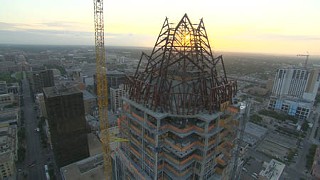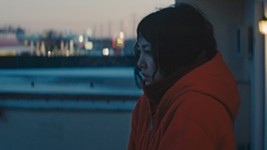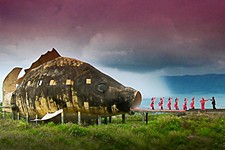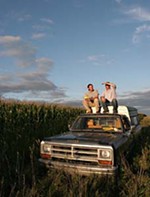Before the Flood
In the struggle between local environmentalists and developers, Laura Dunn's documentary reminds us, Barton Springs was only the beginning
By Marrit Ingman, Fri., March 9, 2007
When Gary Bradley came to Austin as a young man in 1972, he found an urban paradise: low unemployment, ample recreation, and beautiful natural features. So he developed it.
Local filmmaker Laura Dunn (Green) charts Bradley's rise and fall as part of The Unforeseen, a lyrical documentary about Austin's changing landscape – political, ecological, and economic – from the battle over Barton Springs to the suburbanization of Hutto. With its high-definition cinematography (by Lee Daniel) and elliptical construction – Wendell Berry's poem "Santa Clara Valley" is the centerpiece – this is not City Council cinema, though it is passionate about keeping Austin green.
Dunn talked about the film, which bears the Sundance Channel imprint, from her sensibly sized Central Austin bungalow.
Austin Chronicle: More or less, the movie is about the battle over Barton Springs and its aftereffects. So you've chosen to open with a shot of the Frost Bank Tower under construction.
Laura Dunn: Yeah. First of all, while the film is about Barton Springs in a sense, as a sort of community icon and the threat on it, it's a symbol for what's unique and what's precious about Austin. So, in examining one of the threats to Barton Springs, you get into a story that's much broader. I wanted to look at growth and some of the growth wars generally. Through a developer I'd been talking with, I said, "I'd really like to get in the Frost Bank Tower. It's going to be this new symbol of Austin, the symbol of the new Austin. A tower that's much larger than the state Capitol, a bank tower that's looming over the symbol of democracy in Texas." I thought it would be illustrative of some of the new changes in Austin, and also you can see it from Barton Springs when you're in the pool. I wanted to get up in the tower and see it and understand how it's built.
AC: We see Gary Bradley not as a destroyer but as this ambitious guy who comes to Austin to make something of himself. Why tell his story this way?
LD: The film concept originally came from [executive producer] Terrence Malick, who had been living in Austin for 40-some years watching the landscapes change and following the political story. He had the wisdom and depth to see that [Bradley's] story could be a window into what's going on more broadly in this country. It was his idea, and I really didn't know much about Barton Springs. I'd swum there, and I knew it was beautiful, but I really hadn't been interested in the local political fights. When I began reading to get a background of the big players, Gary Bradley was all over it. I remember when I first met him, sitting in his office in this castle overlooking the city. He looks kind of like Ted Turner or James Dean from Giant. He's so cinematic as a person. As a documentarian, I'm drawn to interesting people living their lives in big ways, and Gary was that. It also occurred to me that as someone who's coming to this story with a bias – a concern about what's happening to Barton Springs and the larger natural world – it really would be interesting to see the land through a developer's eyes. It's a long feature film, and instead of a montage of issues, I'd like to give you something personal to hang onto and a dramatic arc to carry you through all the other interwoven stories. His battles with nature provoked him to want to become a developer, so that was a really natural starting place. As I followed his story, a dramatic arc emerged, and it was the best one I had of all the different stories I had mapped out.
AC: You also include the story of new homeowners in Hutto. If they're not going to find affordable housing in Hutto, where are they going to find it?
LD: I think that's a really important question. You know, the developers who are arguing for all these subdivisions are saying, "Firemen and schoolteachers can't find somewhere to live in the central city. We're doing this because we want to provide affordable housing." A lot of those same people are voting for all these incentives for big companies to lure all the Californians here – who are then buying up all the houses centrally and pushing the property values up. The developers and the money interests want to divide and conquer. They want to pit the environmentalists, who are trying to preserve Central Austin, against middle-class people, who are trying to have a nice home without living 45 minutes out of town. At the same time, I really want to get at those larger patterns rather than sit and judge someone in Hutto. I got this question at Sundance. An audience member said, "These people are part of the problem" – talking about that couple, the Perezes – and, "Why didn't you challenge them more?" I can afford to live in Central Austin, so it's not my place to sit in judgment of these people. We're all part of the problem, and these are folks with good intentions who want to have an affordable house. They want a yard and a safe place for their kids to run around in. You have to look at the larger powers that be. I have lots of friends who live in Legends of Western Oaks or these kinds of places. I think you have to challenge those people also, though. Do you really need a 2,500-square-foot house? For the same price you could get a smaller house in Allandale. Then you're investing in your community more, and you're not living right over the aquifer. I think in the long term it's a much better investment.
AC: We see the consequences of the developers' cash-out-and-get-out philosophy when finally there's nowhere to cash out and go to. That's a point made by Curtis Peterson, the farmer from Hutto in the film, who wonders how we'll eat when no one is farming.
LD: Yeah, we have all these houses but no place to grow food, unless we import it, and that has its own issues. With all due respect to people who are working on these issues in the political realm, I tend to get frustrated with the rhetoric, which is all about "smart growth" and "we can grow, but we have to grow in certain corridors." You're going to trade all our farmland for the watershed. I don't think there's an easy out. I think we have to curb growth altogether. I think this is an issue that's much larger than the Edwards Aquifer. It's about all of our natural landscapes and our rate of growth. That's why I wanted to show the farmer and show Hutto and show the kind of Anywhere, USA, landscape, as well.
AC: You have some really great footage of the all-night City Council meeting that resulted in the defeat of the Barton Creek planned unit development. All kinds of people there – old people, young people, intellectuals, freaks, a conservative guy. Do you think that Austin has that kind of enthusiastic coalition-building these days?
LD: No, I don't. I still think Austin's a really great place, and there's a vibrant, active community here that loves Austin. I personally think that you have a lot of new people coming in, like myself, who don't have the same sense of history, and a younger generation that typically is not as politically active. A lot of the people that you saw at that all-night hearing are burned out. They've been fighting the fight for so many years. They felt like they won, but then the state came and trumped them, and all the developments are happening anyway. There's been a factionalizing within the environmental community itself. Some people say, "Now we have to work with developers," so they spin off and form the Hill Country Conservancy. And then Save Our Springs Alliance is still fighting the uncompromised battle. But they're alienating a lot of political allies. And then you have Liveable City, another spin-off, saying, "We can't just talk about the environment. We have to talk about social equity as well." Meanwhile, you have changing demographics in Austin, such that they elect Brewster McCracken, who was really the developer's candidate, over Margot Clark, the environmentalist's candidate. And Stratus – the kinder, gentler Freeport-McMoRan – since that defeat in 1992, they have very strategically and intelligently infused money into all aspects of the community, from the Austin Film Society to the children's museum to the libraries. There's a bit of a conflict of interest in then speaking out for Barton Springs. I would just say I understand we need a new library, and I understand there are other issues besides the environment, but if you destroy the natural environment in Austin, you don't really have much to go on. ![]()
The Unforeseen
Regional Premiere
Friday, March 9, 9pm, Austin Convention CenterFriday, March 16, 6:30pm, Paramount
Saturday, March 17, 11am, Paramount













